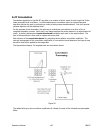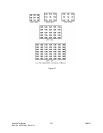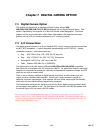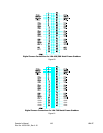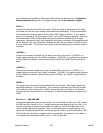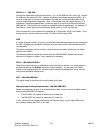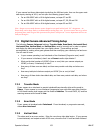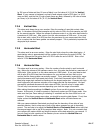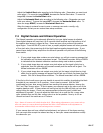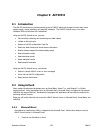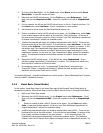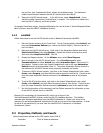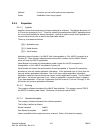Adjust the Vertical Start value according to the following rules. (Remember you must input
even values.) To move the image DOWN, decrease the Vertical Start value. To move the
image UP, increase the Vertical Start value.
Adjust the Horizontal Start value according to the following rules. (Remember you must
input even values.) To move the image LEFT, decrease the Horizontal Start value. To
move the image RIGHT, increase the Horizontal Start value.
When the image is centered be sure to save a <camera>.cam and a <config>.cfg
configuration so that you can restore these setup conditions.
7.4 Digital Camera and Ultracal Operation
The Ultracal! operation can be adversely affected by how your digital camera is adjusted.
Some digital cameras will have their A to D converter black levels set such that some or all of
the negative pixel energy is clipped at Zero. Some may even clip a portion of the positive
signal region. From the LBA-PC’s point of view, a properly adjusted camera will never generate
a Zero pixel value, thus preserving all of the black baseline negative temporal noise. If your
camera has a straight binary output then the Ultracal! operation will yield one of the following
three results:
1. If your output image data contains zero pixel values, you will get a warning message that
the calibration will not be as accurate as normal. The Ultracal enunciator will turn GREEN
to indicate that the obtained calibration results are being used as best as possible
2. If your output image does not contain zero pixel values and the signal is fairly low in
magnitude, then the calibration will proceed normally and the results will be good. The
Ultracal enunciator will turn GREEN.
3. If your output image does not contain zero pixels, but the image is bright due to a high
offset, then a warning message will appear that will ask you to block your beam from the
camera. Click OK to accept these conditions. The Ultracal enunciator will turn GREEN.
If the first or third result occurs you may be able to correct this condition by adjusting the black
threshold of your camera’s A to D converter. Here is how to proceed. With the LBA
uncalibrated and your laser energy blocked from reaching the camera detector, observe the
“Min” and “Max” energy values. If Zero’s appear, your camera is set to clip some or all of the
negative baseline noise. If these values are running too high the LBA will think you have laser
energy
hitting the imager. Check your camera operator’s manual to see if a black level
adjustment is provided. If you can adjust the black level, do so until the Min.
energy
value
never indicates Zero and the Max.
energy
value is as low as possible. Now try to run an
Ultracal! and see if the results are as in 2 above.
Note: Almost all cameras will exhibit baseline drift. When making adjustments to your camera always
allow the camera to come to thermal equilibrium and allow a little headroom on the adjustments to
accommodate additional drift over time and temperature variations
.
If your camera does not have a black level adjustment, and gives on of the above warnings
then you must either accept the reduced accuracy or have your camera manufacturer modify
the camera for you.
Operator’s Manual LBA-PC
154



